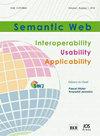A conceptual model for ontology quality assessment
IF 2.9
3区 计算机科学
Q2 COMPUTER SCIENCE, ARTIFICIAL INTELLIGENCE
引用次数: 1
Abstract
With the continuous advancement of methods, tools, and techniques in ontology development, ontologies have emerged in various fields such as machine learning, robotics, biomedical informatics, agricultural informatics, crowdsourcing, database management, and the Internet of Things. Nevertheless, the nonexistence of a universally agreed methodology for specifying and evaluating the quality of an ontology hinders the success of ontology-based systems in such fields as the quality of each component is required for the overall quality of a system and in turn impacts the usability in use. Moreover, a number of anomalies in definitions of ontology quality concepts are visible, and in addition to that, the ontology quality assessment is limited only to a certain set of characteristics in practice even though some other significant characteristics have to be considered for the specified use-case. Thus, in this research, a comprehensive analysis was performed to uncover the existing contributions specifically on ontology quality models, characteristics, and the associated measures of these characteristics. Consequently, the characteristics identified through this review were classified with the associated aspects of the ontology evaluation space. Furthermore, the formalized definitions for each quality characteristic are provided through this study from the ontological perspective based on the accepted theories and standards. Additionally, a thorough analysis of the extent to which the existing works have covered the quality evaluation aspects is presented and the areas further to be investigated are outlined.本体质量评价的概念模型
随着本体开发方法、工具和技术的不断进步,本体在机器学习、机器人、生物医学信息学、农业信息学、众包、数据库管理、物联网等各个领域涌现。然而,没有一种普遍认可的方法来指定和评估本体的质量,这阻碍了基于本体的系统在某些领域的成功,因为每个组件的质量是系统整体质量所必需的,反过来又影响了使用中的可用性。此外,本体质量概念定义中的一些异常是可见的,除此之外,尽管必须考虑特定用例的其他一些重要特征,但在实践中,本体质量评估仅限于特定的一组特征。因此,在本研究中,我们进行了全面的分析,以揭示现有的贡献,特别是在本体质量模型、特征以及这些特征的相关度量方面。因此,通过本综述识别的特征与本体评价空间的相关方面进行了分类。此外,基于公认的理论和标准,本研究从本体论的角度对各个质量特征给出了形式化的定义。此外,对现有工作涵盖质量评估方面的程度进行了全面分析,并概述了进一步调查的领域。
本文章由计算机程序翻译,如有差异,请以英文原文为准。
求助全文
约1分钟内获得全文
求助全文
来源期刊

Semantic Web
COMPUTER SCIENCE, ARTIFICIAL INTELLIGENCEC-COMPUTER SCIENCE, INFORMATION SYSTEMS
CiteScore
8.30
自引率
6.70%
发文量
68
期刊介绍:
The journal Semantic Web – Interoperability, Usability, Applicability brings together researchers from various fields which share the vision and need for more effective and meaningful ways to share information across agents and services on the future internet and elsewhere. As such, Semantic Web technologies shall support the seamless integration of data, on-the-fly composition and interoperation of Web services, as well as more intuitive search engines. The semantics – or meaning – of information, however, cannot be defined without a context, which makes personalization, trust, and provenance core topics for Semantic Web research. New retrieval paradigms, user interfaces, and visualization techniques have to unleash the power of the Semantic Web and at the same time hide its complexity from the user. Based on this vision, the journal welcomes contributions ranging from theoretical and foundational research over methods and tools to descriptions of concrete ontologies and applications in all areas. We especially welcome papers which add a social, spatial, and temporal dimension to Semantic Web research, as well as application-oriented papers making use of formal semantics.
 求助内容:
求助内容: 应助结果提醒方式:
应助结果提醒方式:


